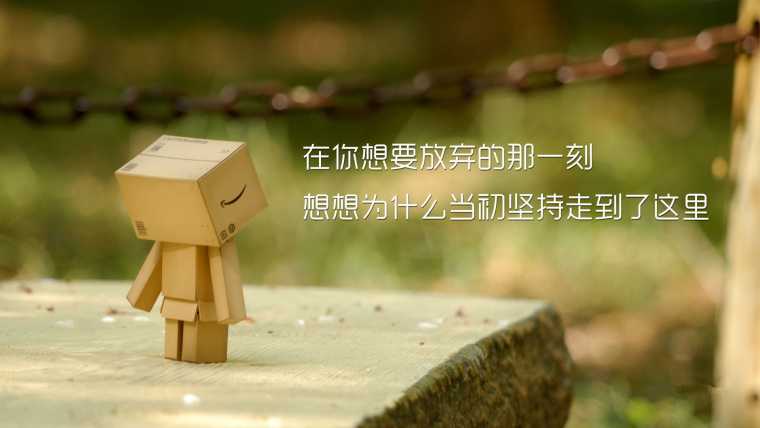英语优美励志文章_优美励志的英文版文章
那些英语版的优美励志文章也是非常正能量的,都很值得一读,那么英语优美励志文章都有哪些呢?一起来看看吧。

英语优美励志文章:在困境中寻找成功的萌芽
There is no better school than adversity. Every defeat, every heartbreak, every loss, contains its own seed, its own lesson on how to improve my performance next time. Never again will I contribute to my downfall by refusing to face the truth and learn from my past mistakes. Because I know: gems cannot shine without polish, and I can not perfect myself without hardship.
Always will I seek the seed of triumph in every adversity.
I am better prepared , now ,to deal with any adversity . No matter what fate has in store for me to know that I will relish it or I will suffer it for only a brief,brief time.So very few understand this obvious truth while the rest allow their hopes and goals to vanish as soon as tragedy strikes. These unfortunately people carry with them, until they die their own bed of thorms and look to others. every day, for sympathy and attention.Adversity will never destroy the person with courage and faith
Always will I seek the seed of triumph in every adversity.
Now I know that there are no times in life when opportunity, the chance to be and do gathers so richly about my soul when it has to suffer cruel adversity. Then everything depends on whether I raise my head or lower it in seeking help. Whenever I am struck down, in the future, by any terrible defeat, I will inquire of myself, after the first pain has passed, how I can turn that adversity into good. What a great opportunity that moment may present……to take the bitter root I am holding and transform it into fragrant garden of flowers.
Always will I seek the seed of triumph in every adversity.
[参考译文]
逆境是一所最好的学校。每一次失败,每一次打击,每一次损失,都蕴育着成功的萌芽,都教会我在下一次有更出色的表现。我再也不会逃避现实,也不会拒绝从以往的错误中获取经验,我不再因此而促成自己的失败。因为我知道,宝玉不经磨砺就不能发光,没有,我也不能完善自我。
我总是在困境中寻找成功的萌芽。
现在我已经做好准备,去对抗逆境。无论我今后面对什么样的命运,我都将细细品味他,痛苦也会很快过去。只有少数人知道这个显而易见的真理,其他人一旦悲剧降临,希望和目标就消失的无影无踪了。这些不幸的人们致死都在苦难的深渊中,每天如坐针毡,祈求别人的同情和关注。逆境从来不会摧毁那些有勇气有信心的人。
我总是在困境中寻找成功的萌芽。
现在我知道,灵魂倍受煎熬的时刻,也正是生命中最多选择与机会的时刻。任何事情的成败取决于我在寻求帮助时是抬起头还是低下头。无论何时,当我被可怕的失败击倒,在最初的阵痛过去之后,我都要想方设法将苦难变成好事。伟大的机遇就在这一刻闪现-这苦涩的根必将迎来满园芬芳!
我将一直在困境中寻找成功的希望。
英语优美励志文章:卓越仅仅是一个习惯
Excellence is not an act, but a habit
Our character, basically, is a composite of our habits. “Sow a thought, reap an action; sow an action, reap a habit; sow a habit, reap a character; sow a character, reap a destiny,” the maxim goes.
Habits are powerful factors in our lives. Because they are consistent, often unconscious patterns, they constantly, daily, express our character and produce our effectiveness or ineffectiveness.
As Horace Mann, the great educator, once said, “habits are like a cable. We weave a strand of it everyday and soon it cannot be broken.” I personally do not agree with the last part of his expression. I know habits can be learned and unlearned. But is also know it isn’t a quick fix. It involves a process and a tremendous commitment.
Those of us who watched the lunar voyage of Apollo 11 were transfixed as we saw the first men walk on the moon and return to earth. But to get there, those astronauts literally had to break out of the tremendous gravity pull of the earth. More energy was spent in the first few minutes of lift-off, in the first few miles of travel, than was used over the next several days to travel half a million miles.
Habits, too, have tremendous gravity pull- more than most people realize or would admit. Breaking deeply imbedded habitual tendencies such as procrastination, impatience, criticalness, or selfishness that violate basic principles of human effectiveness involves more than a little willpower and a few minor changes in our lives. “Lift off” takes a tremendous effort, but once we break out of the gravity pull, our freedom takes on a whole new dimension.
Like any natural force, gravity pull can work with us or against us. The gravity pull of some of our habits may currently be keeping us from going where we want to go. But it is also gravity pull that keeps our world together, that keeps the planets in their orbits and our universe in order. It is a powerful force, and if we use it effectively, we can use the gravity pull of habit to create the cohesiveness and order necessary to establish effectiveness in our lives.
[参考译文]
卓越仅仅是一个习惯
人的品德基本上是又习惯组成的。 俗语说;思想决定行动,行动决定习惯,习惯决定品德,品德决定命运。
习惯对我们的生活有绝大的影响,因为他是一贯的。 在不知不觉中, 经年累月影响着我们的品德,暴露出我们的本性,左右着我们的成败。
美国著名教育家曼恩曾说:“习惯就仿佛是一条缆绳,我们每天为他缠上一股新索,不要多久就会变得牢不可破。”这句话的后半段我不敢苟同,我相信习惯可以养成,也可以打破,但绝不是一蹴而就,而是需要长期的努力和无比的毅力。
宇航员搭乘阿波罗11号太空船,首次登陆月球的刹那,的确令人叹为观止。但宇航员得先摆脱地球强大的引力,才能飞往月球。由此在刚发射的几分钟,也就是整个任务一开始的几英里之内,是最艰难的时刻,所耗的力量往往超越往后的几十万英里。
习惯也是一样,它具有极大的引力,只是许多人不加注意或不肯承认了。想要革除因循苟且,缺乏耐心,吹毛求疵或自私自利等不良习性,若是缺乏意志力,不能大刀阔斧的改革,便难以实现目标。“起飞”需要极大的努力,然而一旦脱离重力的牵绊,我们便可享受前所未有的自由。
习惯的引力就如同自然界所有的力量一般,可以为我们所用,也可能危害我们,关键看我们如何运用。不过,习惯或许一时有碍于达到目标,但也有积极的一面。 宇宙万物各循轨道运行,彼此保持一定的秩序,毕竟也都有赖于引力的作用。所以只要我们善于运用习惯的庞大引力,就能使生活有重心,有秩序,有效率。
英语优美励志文章:一个人何时变老
"I dread to come to the end of the year,said a friend to me recently, "it makes me realize I am growing old.”
William James, the great psychologist, said that most men are "old fogies at twenty-five",He was right. Most men at twenty-five are satisfied with their jobs. They have accumulated the little stock of prejudices that they call their "Principles, " and closed their minds to all new ideas; they have ceased to grow.
The minutea man ceases to grow-no matter what his years-that minute he begins to be old. On the other hand, the really great man never grows old.
Goethe passed out at eighty-three, and finished his Faust only a few years earlier; Gladstone took up a new language when he was seventy.
Laplace, the astronomer, was still at work when death caught up with him at seventy-eight. He died crying, "What we know is nothing; what we do not know is immense."
And there you have the real answer to the question, "When is a man old?"
Laplace at seventy-eight died young. He was still unsatisfied, still sure that he had a lot to learn.
As long as a man can keep himself in that attitude of mind, as long as he can look back on every year and say , "I grew," he is still young.
The minute he ceases to grow, the minute he says to himself, "I know all that I need to know,"--that day youth stops. He may be twenty-five or seventy-five, it makes no difference. On that day he begins to be old.
[参考译文]
“我惧怕临近岁末年尾”,一位朋友最近对我说:“它使我意识到我正在变老。”
伟大的心理学家威廉·詹姆斯就曾说过,大多数人“25岁时就成了守旧落伍者”。他的话是对的。大多数人25岁时就满足于他们的工作。他们已经积累了一些他们称之为“原则”的偏见,对所有新的思想关闭心灵之门;他们已经停止成长。
一个人一旦停止成长--不管他年龄多大--他就开始衰老。反之,真正的伟人从来不会衰老。
歌德享年83岁,逝世前几年才完成《浮士德》;格莱斯顿70岁时又开始学习一门外国语;法国天文学家拉普拉斯78岁死时还在工作着。临死前,他大声喊道:“我们所知的太少太少,我们所不知的太多太多。”
“一个人何时变老?”,从这类事例中对这个问题你已经有了真正的答案。
拉普拉斯78岁逝世时依然年轻。他依旧不满足,依旧感到许多东西要学。
一个人,只要他能够保持这种心态,只要他在回首过去的一年时能够说“我在成长”,他就依然年轻。
他一旦停止成长,他一旦对自己说“我该懂的都懂了”,这个时候他的青春也就完了。他可能在25岁时死去,也可能在75岁时死去,这都没有区别。就在那一天,他开始变老。